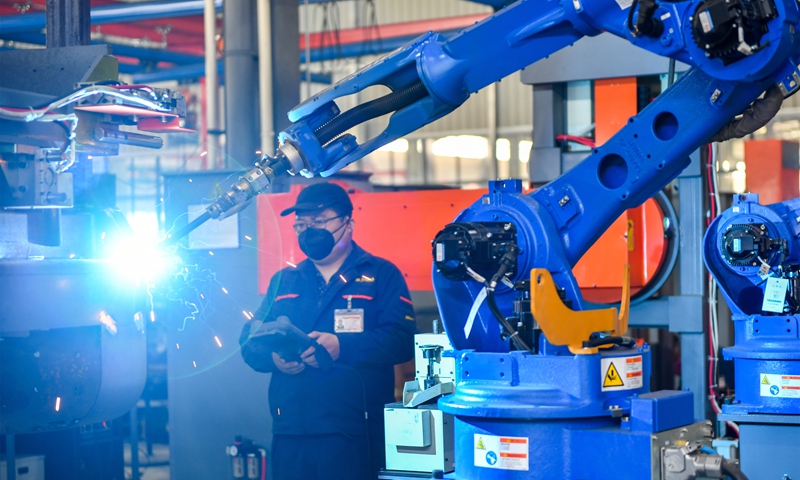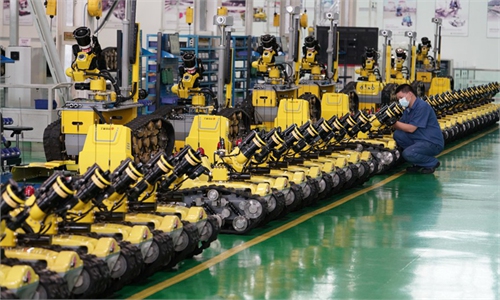China unveils 5-year plan for robotics, smart manufacturing amid global race
Move to bolster competitiveness amid global race in advanced manufacturing

A worker controls an automated robot workstation operating at high speed in a digital workshop in Huzhou, East China's Zhejiang Province on November 30, 2021. The workshop has introduced intelligent production and assembly lines. High-tech products such as 5G unmanned forklift trucks and automated guided vehicles are mainly sold to countries and regions under the Belt and Road Initiative. Photo: VCG
China on Tuesday unveiled a five-year plan for smart manufacturing, vowing that large manufacturers will basically achieve digitalization by 2025, in a bid to bolster the technology and market competitiveness of the sector in a new round of fierce global race in advanced manufacturing.
The plan, released by the Ministry of Industry and Information Technology (MIIT) and seven other departments, came as countries such as the US, Germany and Japan are also pushing to boost intelligent manufacturing.
By 2025, more than 70 percent of large-scale Chinese enterprises should be digitalized, and more than 500 demonstration manufacturing facilities will be built nationwide, according to the plan.
The technical level and market competitiveness of intelligent manufacturing equipment and industrial software should be significantly improved, with market satisfaction rates exceeding 70 percent and 50 percent respectively, the plan said.
The current market satisfaction rate of intelligent manufacturing equipment exceeds 50 percent.
The plan vowed to strengthen research on key technologies such as artificial intelligence, 5G, big data and edge computing.
"The development level of intelligent manufacturing is related to the global position of China's manufacturing industry in the future," said the MIIT statement.
Countries such as the US and Germany in recent years launched efforts to seize the advantage in a new round of global competition with smart manufacturing.
The White House in 2018 released a Strategy for American Leadership in Advanced Manufacturing to ensure the leading position of the US in advanced manufacturing.
In 2019, Germany presented the final version of its "National Industry Strategy 2030," under which the first pillar is to "improve the framework conditions" for Germany as an industrial location.
Compared with leading countries such as the US, Germany and Japan in intelligent manufacturing, China still needs to catch up in software and industrial infrastructure, Zhang Xiaorong, director of the Beijing-based Cutting-Edge Technology Research Institute, told the Global Times on Tuesday.
"The industrial software, operating systems and equipment used in China are mainly from foreign brands. Foreign countries are advanced in related hardware and all kinds of production tools. China is lagging behind in core components like chips," Zhang said.
Also on Tuesday, the MIIT released a five-year plan for robotics industry development.
China's robotics industry will become a global center of technology innovation, manufacturing and application. The quality of complete robots and key components should reach leading international standards, the plan stated.
China will establish three to five robotics industry zones and double the intensity of robot manufacturing. The annual growth rate of the sector's revenue should exceed 20 percent, according to the plan.
China's robotics industry has witnessed a boom in development in recent years, and China has been the world's largest consumer of industrial robots for eight consecutive years.
The application field of industrial robots covered 52 industry categories, including automobiles, electronics, metallurgy, light industry, petrochemicals and medicine, official data showed.
China's robotics sector has formed a complete industry chain, ranging from parts to complete machines to integrated applications. However, Wang Weiming, an official from MIIT, said on Tuesday that there are still gaps and a weak industrial foundation, and the quality, stability and reliability of key components cannot meet the needs of high-performance complete machines.
The level of digital networking in China's manufacturing industry significantly improved during the 13th Five-Year Plan period (2016-20). For example, the domestic market for smart manufacturing equipment has a satisfaction rate of over 50 percent, and more than 70 industrial internet platforms with a certain influence have been cultivated.
Meanwhile, accelerating smart manufacturing has become a key task for deployment in many provinces.
An analyst of an intelligent manufacturing lab based in Guangzhou, South China's Guangdong Province, told the Global Times on Tuesday that China should accelerate the integration and allocation of resources and concentrate on basic and theoretical research, which is in urgent need for development.
"Chips or software systems are at the heart of intelligent manufacturing. They are the brains that command machines and robots to do different things. Otherwise, it would be too costly to produce machines for each different, personalized and niche product," said the analyst, who declined to be identified.
China also unveiled a five-year plan for software and information technology services, for the information industry (including information security) and cloud computing, and for the medical equipment industry.
By 2025, the value added of core industries in the digital economy will account for 10 percent of China's GDP, up from 7.8 percent in 2020, according to plan.



